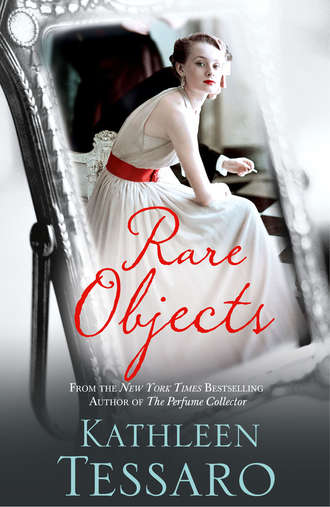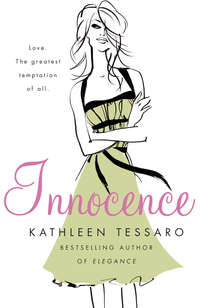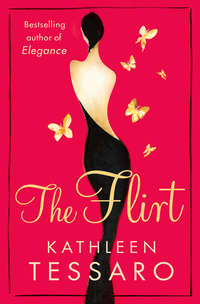
Полная версия
Rare Objects
“It was one of the most wonderful and yet humiliating days of my life,” Ma used to say. “The Marcosa children all loved to hold you because of your red hair. They found it fascinating. The whole neighborhood did. I couldn’t go half a block without someone stopping me.”
She took in seamstress work during the day, piecing together cotton blouses for Levin’s garment factory nearby, and in the evenings she traveled across town to clean offices, taking me with her in a wicker laundry basket, wrapped in blankets. Setting me on the desks, she made her way through the offices, dusting, polishing, and scrubbing, singing in her low soft voice from eight until midnight before heading back across the sleeping city.
But she always hungered for more. And even when she joined the alterations department at Stearns, she’d already had her sights set on moving from the workroom to the sales floor. She enrolled in Sunday-afternoon speech classes from an impoverished spinster in Beacon Hill, taking me with her so that I could learn to enunciate without the telltale lilt of her brogue or, worse, the flat vowels of the Boston streets. I suppose that’s something we have in common—the unshakable conviction we’re destined for better things.
Year after year she continued to apply for a sales position, ignoring the rejections and snubs, refusing to try elsewhere. “It’s the finest department store in the city,” she maintained. “I’d rather mop floors there than anywhere else.” She could endure anything but failure.
Stubbornness is another trait we share.
She still wore the plain, slim gold band her husband had given her on her wedding ring finger, not just as a reminder but also as a safeguard against unwanted male attention.
“Your father would’ve been proud of you, Maeve, getting your secretarial degree.” She took a final drag from her cigarette, stubbed the end out in the sink.
I looked down. “Oh, I don’t know about that.”
“Well, I do.”
All my life, she’d been a medium between this world and the next, advising on what my father would’ve wanted, believed in, admired.
“He had everything it took to really be someone in this world—intelligence, breeding, a good education. Everything, that is, except luck. I just hope yours is better than his.” She sighed.
“What do you mean?”
“Nothing. You’re a clever girl. A capable girl.” Leaning in, she scrubbed the coffee stains out of the sink. “It’s just a shame you lost that job in New York.”
A knot of guilt and apprehension tightened in my stomach. This was the last thing I wanted to talk about. “Let’s not go into that.”
But Ma was never one to let a subject die an easy death if she could kick it around the room a few more times.
“It just doesn’t make sense,” she went on, ignoring me. “Why did Mr. Halliday let you go after all that time?”
“I told you, he’s traveling.”
“Yes, but why didn’t he just take you with him, like he did before? Remember that? You gave me the fright of my life! I didn’t get a letter from you for almost six weeks!”
It was if she knew the truth and was torturing me, the way a cat swats around a half-dead mouse. I glared at her. “Jeez, Ma! How would I know?”
“It just doesn’t make sense. You’ve been his private secretary for almost a year, and then, out of the blue, you’re suddenly out of work and back in Boston!”
“Well, at least I’m home. Aren’t you glad about that?”
She gave a halfhearted shrug. “I’d rather have you make something of yourself. You were on your way in New York. Now you’ll have to start all over again.” Scooping some porridge into a bowl, she set it down in front of me. “I’ll hang the gray suit in your room.”
I gnawed at my thumbnail. I didn’t want porridge or the suit. The only thing I wanted now was to crawl back into bed and disappear.
She gave my hand a smack. “What are you doing? You’ll ruin your nails! Don’t worry so much. With your training and experience, you’re practically a shoo-in.”
I prodded the porridge with my spoon.
My experience.
If only my experience in New York was what she thought it was.

I was falling, too fast, with nothing to stop me … down, down, gathering speed …
I came to with a jolt. I was sitting on the side of a bed wearing only my slip and stockings—a wrought-iron bed in a cold, dark bedroom. Only it wasn’t my bed or my room.
Suddenly the floor veered beneath me, the walls spinning, faded yellow flowers on the wallpaper melting together. Please, God, don’t let me be sick! I pressed my eyes closed and held on to the bed frame tight.
I had to think. Where was I, and how exactly had I gotten here?
It had been a long, dull night at the Orpheum dance palace on Broadway where I worked. The joint was full of nothing but out-of-towners and hayseeds—guys with little money and lots of expectations. By the time we’d closed and I’d cashed in my ticket stubs, I was ready for some fun. Another girl, Lois, had made a “date” with a customer, and he had a friend … Was I game?
Why not? After all, it wasn’t like I had anything to lose.
I remembered two big men, grinning like excited schoolboys, in New York for a convention and laughing the way tourists do—too easily and too hard, willing themselves to have the best night of their lives. One was reasonable-looking, and the other—well, let’s just say no one was going to mistake him for Errol Flynn or Douglas Fairbanks. But there’s that old adage about beggars and choosers, and tonight I felt like a beggar for sure. The last thing I wanted was to be alone and sober at the same time. So we all piled into a cab. Hip flasks were passed round; I remembered Lois sitting on someone’s lap, singing “Diggity Diggity Do.”
We drove to Harlem, to a place called Hot Feet. There was a band from New Orleans and a chorus line of smooth-skinned Negro girls dressed up with grass skirts and bone necklaces, shaking and shimmying for all they were worth. The moonshine had kicked in by then, and I was feeling a bit less rough round the edges. Lois was sure she saw Oweny Madden and the boxer Primo Carnera at the next table, and one of the guys, the ugly one, forked out for a bottle of real gin.
God, my mouth was as dry as the Sahara! What time was it now? What had happened to Lois?
I tried to stand. My head pounded, my stomach swooned. Easy does it. Not too fast.
Someone shifted in the bed next to me.
Shit. Please don’t let it be the ugly one.
I tried not to look. A face you never saw was a face you never remembered. I’d learned that much in New York.
I eased myself up. My knees were sore, and there were holes in my stockings. I guess I must’ve fallen. Going over to the window, I pushed aside the curtain. The street was residential, narrow row houses with uneven terraces crammed together, lamps glowing eerily over abandoned lots between. I searched for something familiar on the skyline, a bridge or a building, but couldn’t see anything. One thing was certain: I was definitely on the wrong side of the river.
I seemed to remember talk of going to a hotel to carry on the party—someplace like the Waldorf or the Warwick. So why was I stranded in some cheap boarding house in Queens or Yonkers with no idea where I was or how I was going to get home?
The man rolled over on to his side and began to snore. I had to get out of here, before he woke.
Where were my clothes?
I nearly stumbled over something and picked it up. But this dress wasn’t mine.
Then a memory came of the day before. I’d borrowed a dress from Nancy Rae, the girl down the hall at the Nightingale boarding house, where I rented a room. It was Nancy’s good-luck dress, a hunter-green serge she’d been wearing when she landed her job at Gimbles; all the girls wanted to borrow it for interviews. I’d given her a dollar for the privilege and even gotten up early to steam the box pleats of the skirt through a towel to make them crisp and sharp without going shiny. When I finished, they fluttered open like a fan round my legs.
See that’s the thing about luck—it has to be courted. You have to seduce it; reel it in slowly without arousing suspicion. It’s so precious that every tiny thing matters—what you wear, which side of the road you walk on, the tune you whistle, or how many birds you see out the window. Nancy Rae’s hunter-green dress had stood in fate’s presence and felt its light touch. And when fate favors anything, you’d best pay attention.
I’d been working as a taxi dancer at the Orpheum for months, waltzing with strangers night after night for a dime a dance. But when I saw the advertisement in the back of the Herald for “a young woman of exceptional executive secretarial skills,” I knew that my luck was about to change.
So I gave Nancy the dollar, ironed the dress, and set out first thing in the morning with my notebook and résumé in hand.
But when I arrived at the address, a full hour ahead of time, there were already fifty girls ahead of me, lined up around the corner of the office building, all clutching notebooks and reference letters, all looking hungry and determined and ferociously confident. I lasted three hours waiting in the cold before the girl ahead of me, a short brunette with a frizzy permanent wave and a big run in her stocking, turned round and announced, “You know they’re not going to see all of us, don’t you? I’ve been standing in lines for months, just trying to get my foot in the door. I tell you, we’re waiting here for nothing, like a bunch of saps!”
No one answered her. You can be six inches from someone’s face in New York City and they can still stare straight through you, like you’re not even there. But when I looked around, I could see from the other girls’ faces that what she said was true.
Then she leaned in closer. “I know a guy who runs the door on a joint off Lexington. If you sit at the bar and are friendly to the customers, they don’t mind serving you for free, especially if you’re good-looking.”
I didn’t know why she was telling me. Did I look like the kind of girl who was at home on a barstool? I lifted my chin a little so I was looking down at her and sneered, “What of it?”
She wasn’t put off. “Besides”—she jerked her head at the others, shivering ahead of us—“today’s not our day, sister.”
There were an awful lot of us. The line stretched right up the block and disappeared round the corner. And it would be so nice to sit down and get warm. I didn’t have any money for breakfast that morning, so my stomach was playing a selection of squeaky, off-key tunes all on its own.
Still, if they could only see my qualifications, give me a chance.
The poodle-haired brunette wasn’t waiting any longer. “Fine!” She rolled her eyes, the voice of reason in a world full of idiots. “I was trying to do you a favor, but if you want to catch frostbite just to be told thanks but no thanks, that’s up to you!”
“Is it heated?” I’m on the thin side, being warm is something of an Achilles heel for me.
She shot me a look like I was from the backwoods of West Virginia. “Sure it’s heated! And they got free peanuts at every table, as much as you can eat.”
As soon as I stepped out of line, the girl behind me shoved forward like I was all that was standing between her and destiny. I tossed a sad smile her way just to show her I knew better. I was off to be fed and watered for free. I’d graduated from waiting around.
The poodle brunette had a name like Ivy or Ida or Elsa, and once inside the club on Lexington, she told me right where to sit and how to play it. She got us both a basket of peanuts and we ate as much as we could stand before she brushed the shells off the table and swung into action. Hers was an entirely democratic brand of lazy hospitality—everyone was included in its warm glow, but no one was singled out; every guy figured he had a chance. Maybe because of this she was a past master at getting men to buy more rounds. It wasn’t long before the morning slipped into the afternoon and the afternoon into the evening. I probably ate a pound of peanuts that day. Soon it was time to head over to Broadway to begin another shift at the dance palace.
Now here I was, eighteen hours later, tripping over Nancy Rae’s lucky green dress, crumpled in a heap on a stranger’s floor.
My life was full of cracks, ever-widening gaps between the person I wanted to be and the person I was. When I first came to this city, they used to be small enough to laugh off or ignore. But over the past year they’d grown wider, deeper. I’d fallen in one again last night.
This was the last time, I promised myself.
The very last time.
I found my coat in the corner, thrown over a chair. My new hat, the one I’d splurged on when I got my first job, had been stepped on, squashed into a flat felt circle, the black net that had framed my face so charmingly torn and dangling miserably from a few threads.
I got dressed. Unfortunately I’m good at this—navigating creaky floorboards and sleeping men, finding clothes in the dark. It’s a loathsome talent.
All I needed now was my handbag.
I searched the floor, the bedside table, then on the dresser. A watery blue beam of moonlight streamed in from the crack in the curtains. An old-fashioned gold pocket watch and a pair of cufflinks sat on top of it. Next to them was a photograph of a dark-haired woman holding a toddler. Both were smiling—big, wide, foolish grins. “To Daddy, with all our love” was written in a woman’s rounded hand across the bottom right-hand corner.
I wanted to throw up.
The guy in the bed snorted, coughed. I spotted my bag, jammed between the bedposts, and eased it out.
The room was quiet except for the snoring and a gentle ticking sound; a steady march of time.
I picked up the watch. Solid, smooth, and heavy, it had a pleasant, reassuring weight. My fingers closed round it; it fit neatly into the palm of my hand.
Three twenty-three a.m.
Plenty of time to get back to the boarding house and sleep it off before work tonight. Plenty of time to re-iron Nancy Rae’s dress before returning it. Maybe I’d buy a paper on my way home, get a head start on finding another job. That’s what I told myself. But more likely I’d just stay in my room, too ashamed to let the other girls see me coming in at dawn, lock the door, and lie in bed all afternoon, listening to the music of the landlady’s radio seeping through the floorboards. And I’d imagine how maybe soon things would be different; a man would come into the dance hall who was decent and kind or I’d stumble across a real job or maybe finally I’d just give up altogether, go home …
Tomorrow my luck would change. Tomorrow I’d try again.
Only I had to get through tonight first.
I don’t know why I took the watch. Maybe it was just an accident. Or maybe because of the stupid hopeful grin on the woman’s face in the picture, or because of the way the man in the bed smelled like mothballs and sour sweat. Maybe just because it gave me something to hold on to.
I don’t know why. But I did.
And I really wish I hadn’t.
Because after that, things got a lot worse.
New York City was the knife’s edge of opportunity—modern and progressive. A place where a girl could leave her past behind and get a job and a life that really mattered. Every day smart young women with bobbed hair and cherry-red lips poured out of the subway stations at eight in the morning to take over the world, and no one batted an eye. No one cared either when they ended the day sipping cocktails in underground clubs next to their male colleagues.
I told everyone that I went to New York City because I didn’t want to end up just another pair of hands in a typing pool. Sharp, efficient, able to anticipate every need before it arose, I saw myself rising through the ranks and becoming indispensable to a high-powered corporate executive. I wanted freedom and excitement; that’s what I said. And that was partly true, but it wasn’t the whole story.
I had just enough ability to make my hubris seem like healthy ambition. Even after the Crash hit, I’d always landed on my feet in Boston; even been able to take my pick of jobs. I thought I could make it. And for a short time, I suppose I did. I got a job at a brokerage firm working for the CEO and bought myself a fancy new hat to celebrate. But after six months the business went bankrupt and they found him underneath his desk, burning pages from his address book. After that I received an extended lesson in humility.
Turns out I wasn’t as uniquely talented as I thought, that the city was crammed to the gills with girls with the same credentials, and the landlady at the Nightingale wasn’t very patient when it came to rent. I ended up working as a taxi dancer at the place on Broadway, the Orpheum. They were short on redheads and prided themselves on catering to all tastes. So I got a job dancing with strangers.
I went from top of my typing class to bottom of the pecking order in the girls’ locker room. I rented a secondhand gown from one of the other dancers and borrowed a pair of slippers until I got paid. The other girls weren’t particularly nice or mean, just jaded and tired. And luckily for me, there wasn’t that much competition in the redhead section. You have to sit in groups round the edge of the dance floor, blondes with blondes, brunettes with brunettes, and the guys stroll around eyeing you up the way a woman looks at an apple at a fruit stall—trying to find one that’s not too bruised, not too soft. Some girls winked and flirted, others carried on chatting among themselves as if ignoring the customers sharpened their appetite. I used to close my eyes and try to drift inside the music—I didn’t like to see the look on the guys’ faces if they passed me by.
You think you’re lucky when you’re chosen, but of course now you’ve got a whole other world of difficulty ahead of you—keeping their hands where they belonged was a full-time job, and one that had to be done with a smile on your face. And it’s not easy to make small talk with a guy who doesn’t speak any English, or who’s trying to hustle you for a free date. But every misfit in the city is your sweetheart for the next three minutes—the gropers and the bullies, the small-town Casanovas; the shy boys, the physically deformed, foreigners fresh off the boat; older men, looking for company. You have to charm them while letting them know you’re not for sale. Only you are, really.
Of course I didn’t tell Ma where I’d landed. I made up a story about being a private secretary to an eccentric millionaire—Mr. Halliday. I gave him odd habits and a demanding personality. That explained away the late nights and why I was never at the boarding house when she called. And also why I never came home.
After all, it was only meant to be temporary. But it turns out there’s a lot of money to be made as a taxi dancer—almost forty dollars a week sometimes. And I pretty much had the redhead market cornered after about a month. I found that if I had a few shots while I was getting ready and then kept myself topped up through the night, it was just about bearable. I wasn’t the only girl with a bottle in her locker—most of us had something. And it wasn’t like we went out of our way to hide it either. The management knew the score and never bothered anyone unless a girl was stupid about it and got sloppy or sick.
Pretty soon a few of us started going out after the dance hall closed, just to finish up the night. That’s when the clubs got really interesting. Sometimes I’d make it back to the boarding house and sometimes I wouldn’t. It wasn’t something I was proud of. Sleeping all day, working all night, in a city like New York gets lonely.
But then I took the watch.
Turns out that guy was really fond of that watch; his father had given it to him, and his father before that. Turns out too that he remembered where I worked and showed up the next night hell-bent on getting it back.
By that time, I didn’t even remember I’d taken it. But he found it in my coat pocket, so there was no way I could talk my way out of it. He started making a scene, right there in the middle of the dance floor, shouting that I was a thief and a liar, and then the management had no choice but to let me go.
Only that wasn’t enough for him. He figured I still owed him something. And when I came out of the back entrance of the building after cleaning out my locker, he was waiting there to get it.
You have to give it to New Yorkers—they’re pragmatic people. They don’t get involved unless they have to. They can turn a blind eye, ear, or anything else you want to name. When he was done, he left me lying in the alleyway. Somehow I managed to get up, button my coat over my torn dress, and walk twenty-three blocks back to the Nightingale.
Then I ran a bath, poured another drink, and took a razor blade with me into the bathroom.
That’s how I ended up at the Binghamton State Hospital, otherwise known as the loony bin.

In the end, Ma won; I found myself standing in the empty outer office of the Belmont Placement Agency in Dewey Square, wearing the gray suit. I’d lost weight; the jacket sagged around my bust like a deflated tweed balloon. I tried to cover it up with my scarf, but it was hopeless.
I wondered where everyone was. I’d known the woman who ran the agency, Maude Williams, since I began secretarial school. As a star student, I was singled out as early recruitment material, and she gave me the pick of any position I wanted. It wasn’t long ago I’d been sitting across from her, turning down extra pay because I couldn’t wait to get out of Boston. But things had changed. There was a time when Maude had a receptionist of her own; when these dingy little rooms were crammed with girls, ready to go anywhere Maude sent them. Now I was the only one there.
On the way the trolley had passed by Boylston Street, near the Common. Crowds of homeless sat huddled around campfires in a makeshift shantytown. There’d been outrage and shock over their invasion before I left, but now there were twice as many. They had become invisible in their poverty, sleeping on cardboard boxes in doorways, selling apples on street corners. It wasn’t quite as bad as New York and the sprawling Hooverville that had taken over Central Park, but still it sent a chill up my spine.
In the North End, too, there were things I hadn’t seen before—big signs hung from the front gates of the shoe factory and the railroad yard: “Jobless Men Keep Walking—We Can’t Feed Our Own.” And on Hanover Street this morning, the corner was crowded with men, maybe fifty or sixty. They were all waiting for the construction trucks to drive past on their way to the building sites in the city, looking for day workers. When they stopped, all hell broke loose—swarms of bodies engulfed them, shouting, shoving, clambering aboard. The foreman had to push them down like animals, banging on the side of the truck to start moving again.
Please God that didn’t happen to me.
I jammed my hands into my pockets.
“Ouch!” Something sharp stabbed my palm, and I pulled out a bent safety pin. Another one of Ma’s superstitions: “A crooked pin in the pocket brings good luck.”
A minute later I was sitting across from Maude—short and solid, somewhere in her late fifties, a hard smear of red lipstick highlighting her thin lips and thick black glasses framing her eyes. Straight-talking and unflappable, Maude was the first and often only port of call for anyone looking for a truly professional secretary. Or at least that’s the way it used to be.
“Jesus, kid!” She took a hard drag on her cigarette and leaned back in her desk chair. “I never thought I’d see you again! What are you doing back?”








